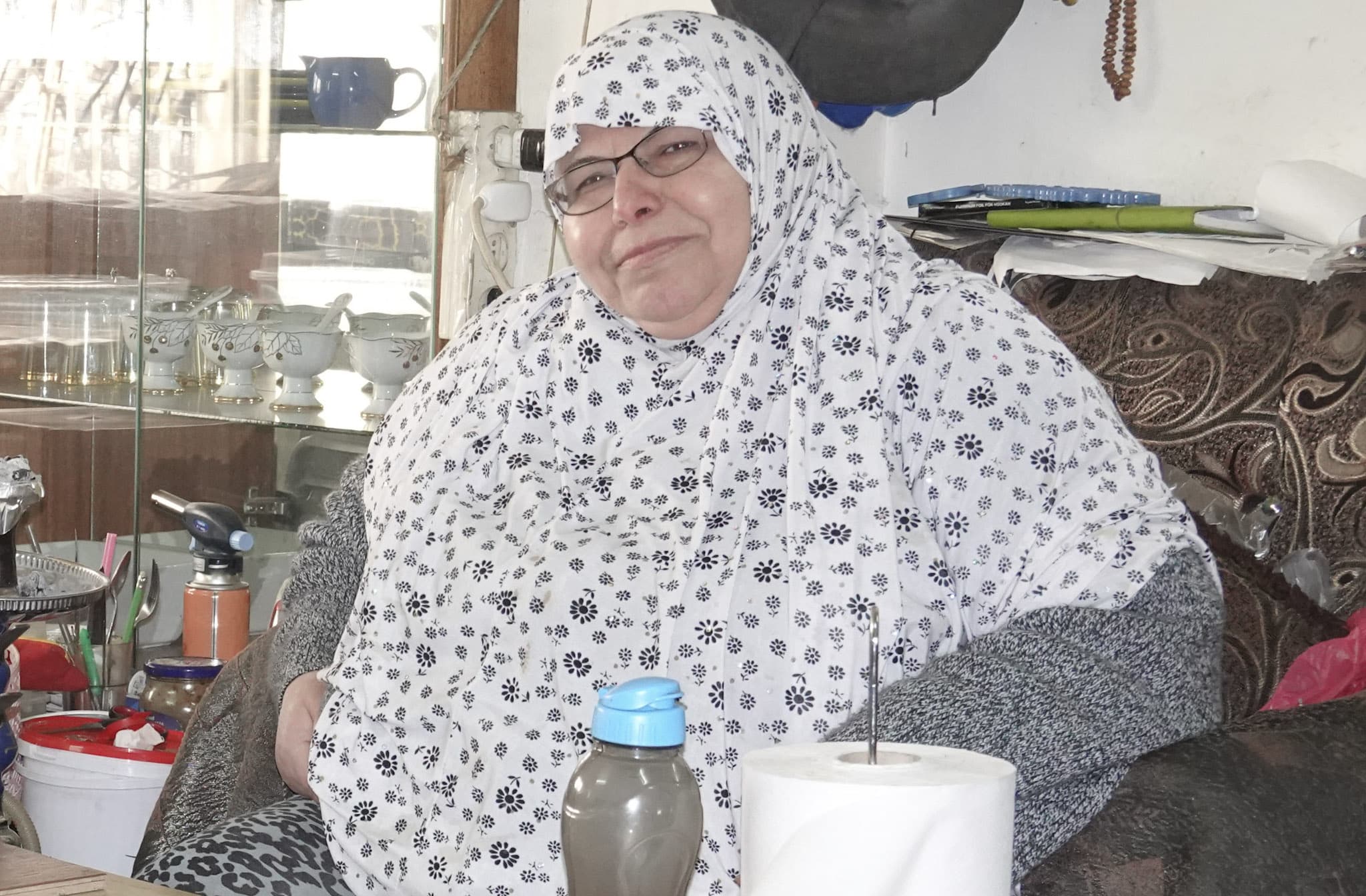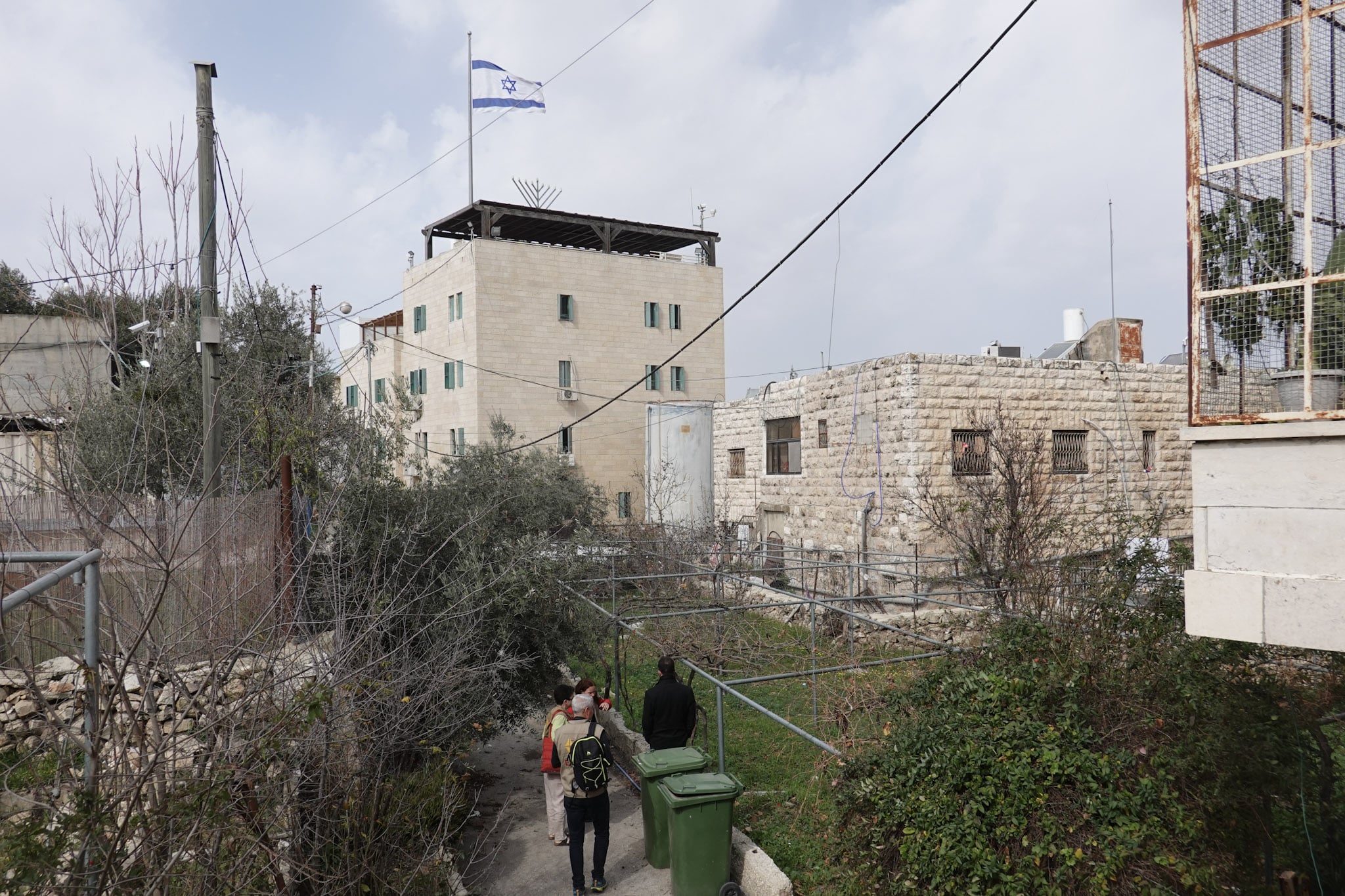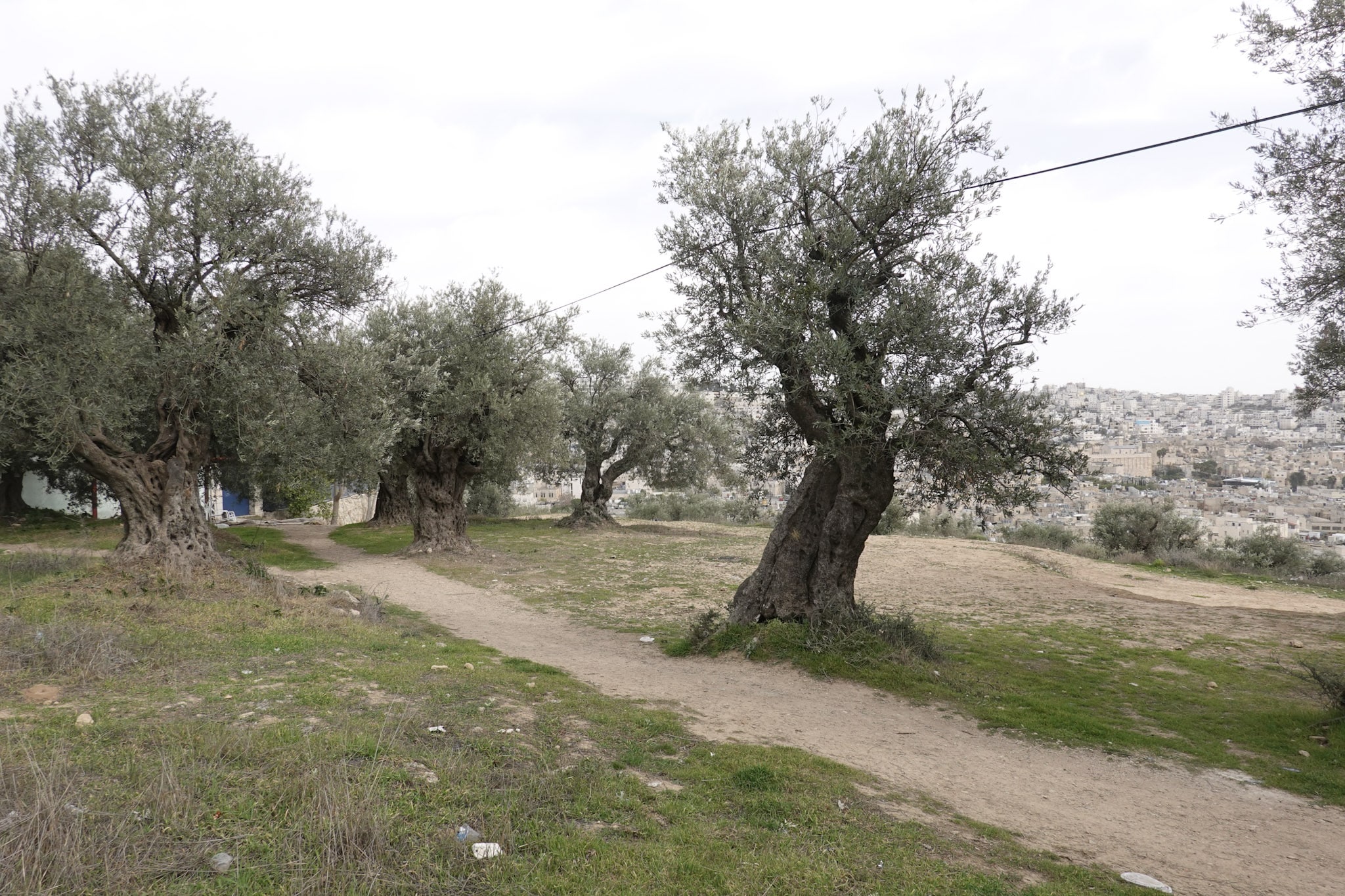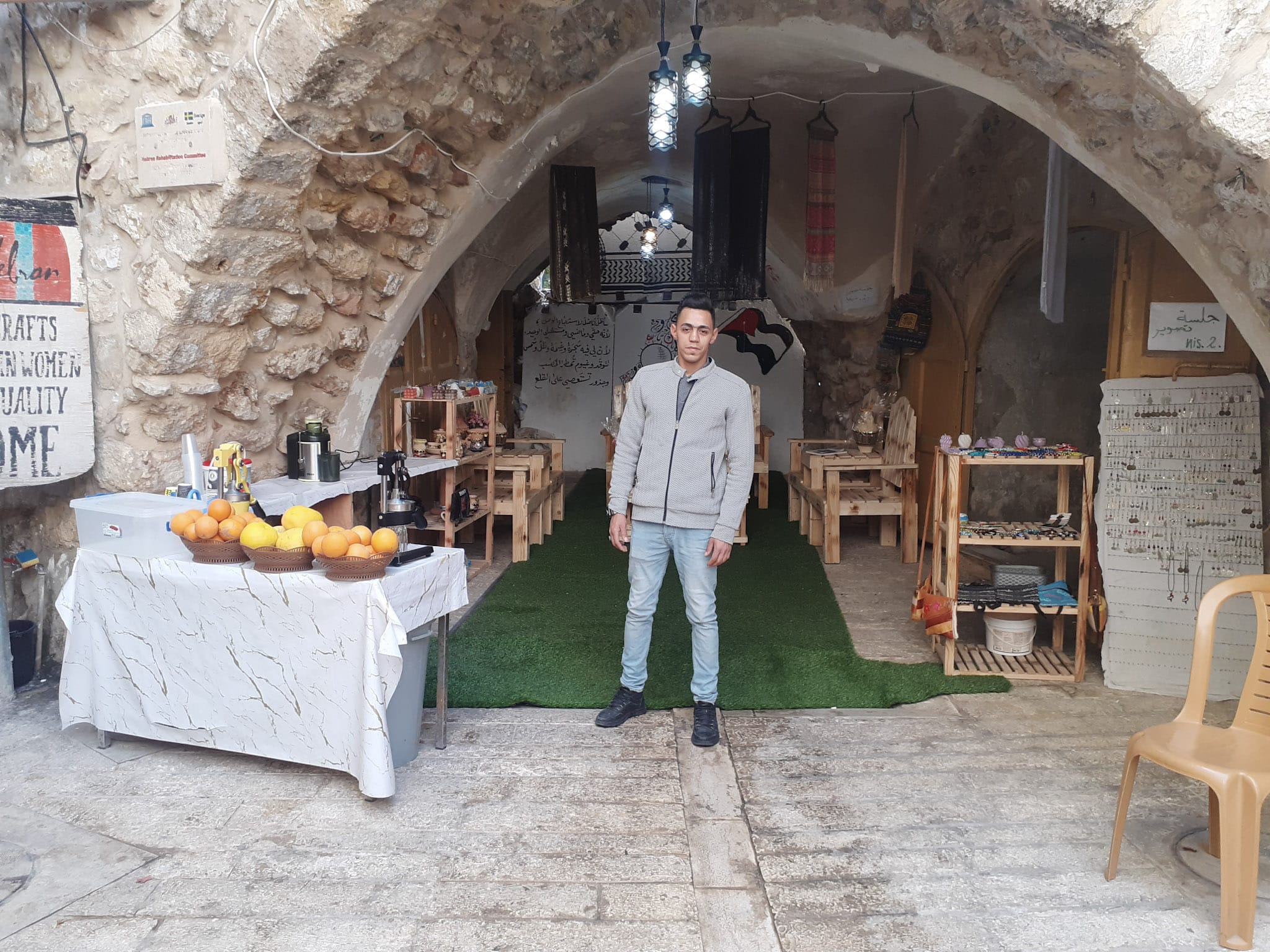‘This is our home and how we earn a living… Where would we go and what would we do if we moved away? Besides, I don’t want to move. I want to stay in Hebron where I was born and stay in our community.’
Ghandi, Hebron
Hebron is unique in the occupied West Bank as the only Palestinian city with Israeli settlers living at its heart. Once a bustling commercial hub, Hebron’s Old City is now heavily militarised. Many Palestinians have moved from the area, businesses have closed down permanently and the close proximity of a number of illegal Israeli settlements to Palestinian homes creates a distinctly tense atmosphere. Despite increasing cases of settler violence and harassment, many Palestinians continue to resist pressures to leave the area, and remain steadfast in their homes and businesses. I recently met up with two such residents, Hanna and Ghandi.
Settlers at home
Hanna is a cheerful elderly lady with a strong character who worked as a hairdresser and make-up artist for 36 years. She formed the Palestinian Hairdressing Syndicate and was the first Palestinian to judge international competitions when Palestinians first became involved. She and her sister have won many competitions in 12 different countries including America, the Netherlands, Saudi Arabia and Egypt. We visited her in her late parents family home where she lives with her relatives including her sister, sister-in-law and 12-year-old nephew.

Hanna, Hebron
Walking through her gardens, there are trees filled with ripe lemons, as well as ancient olive trees, which are hundreds of years old. Their house is within a few feet of the neighbouring Israeli settlement of Tel Rumeida, which began as an outpost in 1984, when several Israeli families arrived in caravans on the hill. Since then the settlement has expanded considerably and Hanna now has settlers living on two sides. As we stood in her back garden, an Israeli flag flew high above the house from a settlers home next door.

Settlement next to Hanna’s home

Hanna’s olive trees
In 2012 when her father died, Hanna and her sister decided to close their hairdressing salon because they needed to spend more time at home to protect it from being damaged by neighbouring settlers. These threats to her home are ongoing. In recent months, settlers came and harassed the family by singing insulting songs, banging and kicking the gate and shouting. Hanna has a large screen next to her TV which shows images from several CCTV cameras so she can always see who is approaching from any direction. She and her sister fear leaving their house empty in case settlers break in and damage it. This is particularly difficult when they run out of gas and have to get new cylinders. When they do go out, they frequently have stones thrown at them.
‘Over the years, systematic abuse and harassment of Palestinians by settlers has become an established part of life in Hebron. As often as not, the abuse takes the form of severe violence. Documented instances include physical assault, stone-throwing, vandalism of shops and doors, theft, verbal abuse, attempts to run Palestinians over and several cases of gunfire.’
Hanna has had five different cars vandalised outside her gate so she can no longer park here. Once one of her cars was burnt so badly that nothing could be used even as spare parts. She now parks her car about three hundred metres from her property and her and her sister carry everything they need to the house. The difficulty she faces getting around and her fear of leaving her house unattended means that Hanna stays at home most of the time, restricting her free movement.
Hanna admits she is proud and doesn’t like to ask for others help navigating these daily issues;
‘You would have cried to see how I struggled to carry my shopping from the road. I had to ask a man who was visiting a neighbour to help me. Imagine, you are visiting someone and then have to carry an old lady’s shopping!’
Hanna, Hebron
Settlers are currently trying to purchase Hanna’s neighbours land and she is afraid that if this goes ahead, the attacks will worsen and she will become more isolated. She has been fighting against the sale in the Israeli courts and has successfully won three orders to temporarily stop building work on the land, but the settlers continue to press for the sale. The legal battles continue on with all the uncertainty this brings.
When Hanna’s father was still alive, she and her sister promised him that they would not leave the property for settlers to take over. It is their form of resistance against the occupation but she tells us that it comes at a high cost; harassment, the feeling of being trapped at home, health issues due to pressure and stress, and higher costs for repairs because workmen charge more because of the risk of violence from settlers.
Settlers at work
Ghandi has a fresh juice stall in Hebron’s souk. He has lived above the shop with his parents, wife, children and cousins for many years. He does his best to make a living by selling freshly squeezed fruit juice and by making candles and selling sweets. He tells us that it is difficult to make a living because there are few customers. Even international visitors which pass through the souk are usually being taken quickly by their guide to visit the famous Ibrahimi Mosque and so don’t have time to stop any buy from him.
‘For years, the Palestinians living in [Hebron] have been subjected to extreme restrictions imposed by the military. As a result, huge numbers of residents moved out and hundreds of businesses were shut down, leaving the area in economic ruin.’

Ghandi, Hebron
At the back of Ghandi’s shop is a concrete wall with a Palestinian flag painted on it, which was constructed in 2000 to separate his shop from the Avraham Avinu settlement, which is directly behind the souk. It is so close that the shopkeepers have had to put wire mesh over the souk footpath where customers and tourists walk, to protect them from the stones, rubbish and other things which settlers throw from their homes at Palestinian businesses. For years the settlers have been trying to expand their homes into the shopkeepers shops. Ghandi has been offered a lot of money to sell up but he says;
‘This is our home and how we earn a living… Where would we go and what would we do if we moved away? Besides, I don’t want to move. I want to stay in Hebron where I was born and stay in our community.’
Ghandi and his family have also faced consistent violence from settlers. In 2007, his two year old twin brothers died from smoke inhalation when a settler threw a Molotov cocktail into their home above the shop. In April 2023, settlers climbed onto his roof top patio and threw rubbish into his stairwell. A week before, the settlers had also threw things down from the roof, including stones.
Many Palestinians in Hebron remain steadfast in their homes and businesses, despite mounting pressures from nearby settlers. According to the United Nations Office for the Coordination of Humanitarian Affairs, attacks by Israeli settlers against Palestinians in the West Bank are rapidly increasing. In 2022 there were 849 attacks, compared to less than half this figure in 2019.
‘The restrictions and unremitting harassment that Palestinians suffer… which result entirely from Israel’s decision to allow settlers to live there – prevent them from leading a normal routine and make life in the area unbearable. Israeli authorities thereby promote an ongoing transfer, driving Palestinians out of Hebron’s city center.’
Take action!
-
Watch and share the powerful short film by the New York Times, Mission Hebron, to hear directly from Israeli soldiers who have served in Hebron.
-
Use our quick template letter to send this eyewitness story to your elected representatives and faith leaders and ask them to speak out against illegal settlements and for the right of Palestinians to be protected from all acts of violence, in compliance with international law.
-
Part of a church or other faith community? Send them the Investing for Peace campaign postcard and ensure they are not investing in funds which profit from the occupation.

